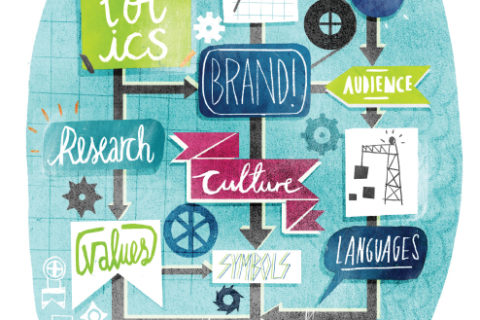Katie Aylward
As a fresh graduate, having only been in market research just over a year and still relatively new to the industry, I was quite baffled, to say the least, when ESOMAR got in contact with me asking for an interview, to hear my opinions on the industry as a young researcher, which would subsequently go into their Global Market Research Report 2014. Why did one of, if not the biggest global market research association want to hear my thoughts? Why did I bear any kind of relevance to them, as someone so early on in my research career?
Well it turns out that there’s a lot of interest from the industry on young researchers, the millennial generation or Gen Y, whichever of our numerous acquired monikers you want to use. We are the generation that is set to start moving into managerial and more senior positions in the next 10 years or so which explains why there has been a real emphasis in trying to understand us, so that the industry can not only attract, but also retain more of us.
The problem is, as I discussed in the Global Market Research report, I feel there is a general lack of awareness surrounding the industry. Especially in universities, which themselves present one of the most predominant, largely untapped platforms to potentially recruit the next generation of industry influencers. I myself, along with the majority of my contemporaries, was completely unaware of what Market Research even was until a graduate recruiter introduced me to the industry, by matching it with the specific skills that I had learned at university. Many university courses provide students with essentially a ready-made skill set for market research, we just aren’t made aware of it. With more and more course integrating modules that train us in skills and techniques that are directly transferrable to the industry, it seems a bit of a mystery as to why market research isn’t advertised to such subjects.
The most enticing part of the industry for me was being able to use what I’d learned at university, from the research methods to taking theories from psychology and behavioural economics and utilising this to help aid understanding of consumer behaviour. Exploring behaviour has always been hugely fascinating to me, and so having the opportunity to apply this on a huge scale in a commercial context, which ultimately helps to inform important business decisions and strategy for clients is what makes the industry so appealing. Young researchers often get the chance to establish their presence not only within their organisation, but in the wider industry too. The focus of this post; getting my thoughts and opinions published in the Global Market Research report, speaking at the ESOMAR Congress this year and the general encouragement we receive to write pieces for online industry magazines, evidences this point.
Millennials have been well documented and there is a particularly vast amount of research on millennials in the work place. As explored in the MLSGroup’s global ‘Millennial Compass Survey’ (2014), it has been recognised that millennials regard experiences, exposure to challenges and mentoring more valuable than structure, title and corporate hierarchy. Market research is an industry where hierarchy is fairly fluid and junior researchers are encouraged to take on more responsibility than perhaps would be allowed in certain other industries. This panders to the millennial desires for challenge and experience, rather than being relegated to the bottom rungs of the ladder and carrying out basic, ‘junior-level’ tasks.
The sheer variety of the work that we undertake indulges the millennial hunger for innovation and creativity. As an industry we are at the forefront of consumer trends and motivations and to explore these trends, gauge consumer sentiment and monitor the status quo we utilise the technology that millennials, being digital natives (Prensky, 2001), have grown up with. In particular, the use of mobile and social media research tap into millennial interests, transferring our real-life hobbies, into the working context. But it’s not just about being completely comfortable and competent in conducting research utilising the various platforms that we use in our personal lives. Our experience of using such platforms, having our fingers constantly on the pulse of contemporary society and our natural curiosity drives us to attempt to understand and draw knowledge and insight from modern consumer culture and its implications in our research.
Of course I could go on and list a whole host of reasons as to why Market Research is a great career choice for fresh young graduates and millennials, but the crux of the issue that I talked about in the Global Market Research Report is that there is not enough being done to convince them of this. If the industry considers research such as this, we can see that actually Market Research is a perfect fit for the typified millennial traits. The next is step is just figuring out how to leverage this research to their advantage in attracting and retaining these tech-savvy, heavily driven young researchers.
Here is a list of the top 5 things that, in my opinion, organisations such as ESOMAR and MRS could be doing to really attract millennials to research:
- As I discussed earlier, there is a problem with general levels of awareness about market research. So the first point of call in my view would be to raise awareness in higher education institutions such as colleges and universities. As it happens, the MRS and AQR already have a scheme called the ‘Universities Roadshow’, which I am involved in. Young researchers visit universities across Britain to conduct lectures on why market research might be a good career choice. However, whilst this is one mode of attack, there are still opportunities to penetrate further into the higher education system from different angles.
- Have more of a presence at careers fairs and events. Whilst careers talks are a great way of introducing people into the industry, there is always a chance that your audience is going to be limited. If people don’t know what market research is in the first place, or rely on the old stereotype of the clipboard, then it is unlikely that they would want to receive a lecture on it. Having a greater presence at careers fairs and events would increase awareness of the industry and give people greater understanding of what it actually entails. A 5-minute chat with an accompanying leaflet or information pack would hopefully encourage more people to attend more in-depth talks about the industry.
- Highlight the industry’s social and cultural considerations. We can all listen to someone tell us about why our skillset might be a good match for a certain career, but there are many other facets to, and opportunities in, our industry that should be real drivers for millennials to want to get involved. Yes, a lot of our research is commercial, but we also inevitably do a lot of social and cultural work too. According to the Cone Millennial Case Study (2006), millennials are civic-minded and socially conscious. Conveying that these traits that can be engaged and utilised shows the diversity of research and is sure to entice the millennial mind set.
- Highlight training and learning opportunities. The very nature of research is to find out what makes people tick and why they behave in the ways that they do across different markets and countries. We are often encouraged to enhance our understanding of individual and cultural differentiations through the provision of academic teachings and references and also training courses. We can attend regular seminars, workshops and lectures from academic thought leaders and industry figureheads. Food for thought to feed the insatiable drive and appetite for self-progression that millennials possess.
- Make known how millennial-friendly this industry really is. There are so many events, conferences and courses that are solely focused on young researchers. On entering the industry as a young researcher, you are very much entering a community of fellow young researchers, who are always encouraged to make their voices heard. Emphasising how much the industry does actually cater for young researchers would surely be an excellent selling point for those who want to immerse themselves and have the opportunity to work alongside other young, intelligent people.
Katie Aylward is a Research Executive at Northstar Research



2 comments
I absolutely love your blog and find many of your post’s to be precisely what I’m looking for. Do you offer guest writers to write content for yourself? I wouldn’t mind producing a post or elaborating on a lot of the subjects you write in relation to here. Again, awesome site!
[…] Part of the problem is that university students are not aware of the opportunities in market research. Katie Aylward, a young market research professional, shares the following in RW Connect: […]